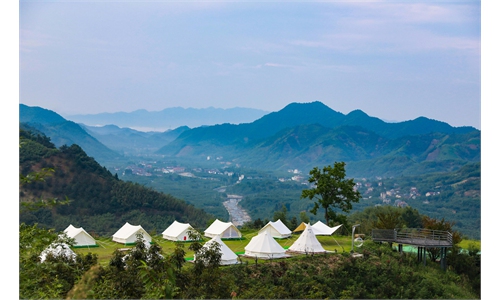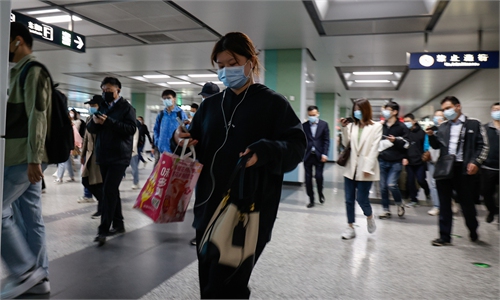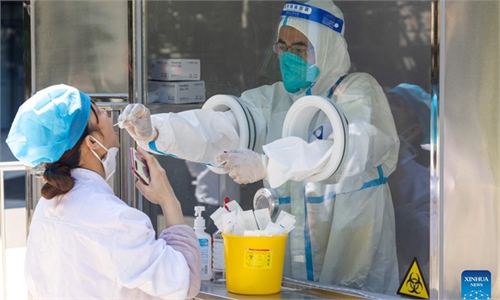COVID-induced 'new economy': Advent of outdoor camping, ready-to-cook meals, nucleic acid testing
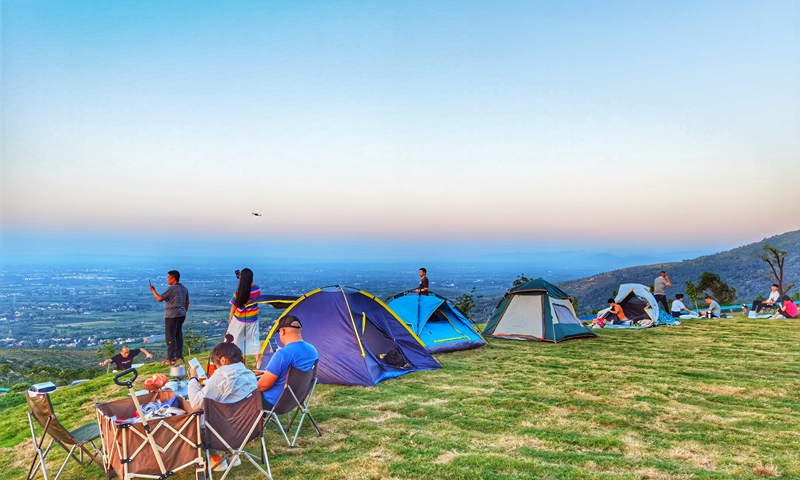
Tourists camp at Mount Wan'an in Luoyang, Central China's Henan Province, on September 11, 2021. Photo: VCG
The outbreak of the pandemic has dealt a heavy blow to most businesses across the world. Now, two years have passed, those pioneers who are innovative and enterprising to meet the consumer demands have reaped rich rewards.
In China, the world's second largest economy, new business opportunities well up, including the outdoor camping frenzy, ready-to-eat meals, smart logistics, VR/AR devices, nucleic acid tests-related industries to fight the virus, and other sectors.
Industry players pointed out that these new trends, though emerging with the epidemic still biting, may indicate the transformation direction and trend after the epidemic fades away one day.
Camping frenzy
During the recent five-day May Day national holidays, camping became a silver lining for the domestic tourism industry as COVID-19 restricted most long-distance travel in the country.
Picnicking, cooking, chatting with friends, watching the stars while sipping coffee in a tent, became popular on social media, generating a surging demand for products and services like kites, frisbees, barbecues, bonfires, open-air movies, as well as recreational vehicle trips and other outdoor leisure items.
According to Tianyancha data, as of April 16, 2022, there were 24,845 camping-related companies, of which 19,917 were established within the past three years; 34,970 were tent-related products, and the number of companies set up in the past three years stood at 19,917.
Investors are also chasing after the trend - in March 2022, the "Haiking" wild luxury camp, a brand specially targeting family camping, received a million-dollar investment. Outdoor equipment brand Nature-hike announced the completion of nearly 100-million-yuan investment.
"At present, there are not many tourism-related investment opportunities, with camping deemed a short-term trait, and its business volume remains limited," an industry player, who asked to remain anonymous, told the Global Times on Tuesday.
The person said that per capita spending on outdoor travel-related products in China is merely one-fourth of the European and American markets, though the industry has a huge potential for development.
A study done by Guangzhou-based research firm iiMedia Research showed that the scale of China's camping market increased from 7.71 billion yuan ($1.16 billion) in 2014 to 29.9 billion yuan in 2021, and it is expected to grow by 18.6 percent in 2022 to reach 35.46 billion yuan.
But the camping industry still needs to grow rapidly, through improving its products and services, diversifying leisure events at the popular campsites, as the domestic travel sector takes advantage of the pandemic restrictions that discourage tourists from going abroad, said the person.
"The pandemic tends to batter most travel and leisure activities, but the high-end customized travel services will attract more customers in the long run, betting on China's rising middle class," the industry player added.
Ready-to-cook meals
Also, Chinese consumers are showing an increasing appetite for prepackaged foods over the past two years, with ready-to-eat meals prepared by restaurants and eateries, and delivered to homes enjoying rapid growth.
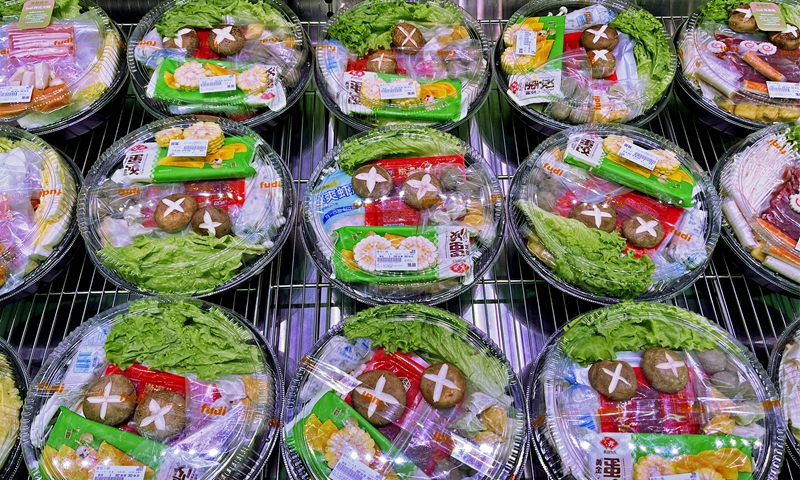
Prepackaged foods in a supermarket in Beijing, on April 9, 2022. Photo: VCG
A survey found more than 60 percent of the restaurants in China have plans to focus on retail catering business after the pandemic is over. Now, some large-scale chain restaurants have established mature food supply chains and innovation capability for their dishes. The reputations of their brick-and-mortar restaurants could help promote business, according to a report by China Chain Store& Franchise Association.
According to a report released by Shenzhen-based research firm AskCI Consulting, China's current market size for premade food is about 300 billion yuan, with the potential to expand to a trillion yuan in the next six to seven years.
Nucleic acid tests
Demand for mass nucleic acid tests is also on the rise in China, driving the development of domestic test-related service companies.
In addition, with negative nucleic test results becoming the ubiquitous "entry pass" for entering public venues, many cities in China have proposed to build a "15-minute nucleic acid sampling service circle" to meet the growing needs of the public.
Independent nucleic acid testing facilities such as nucleic acid sampling booths, nucleic acid sampling cabins, and nucleic acid sampling mobile vehicles have all become common sights in major Chinese cities.
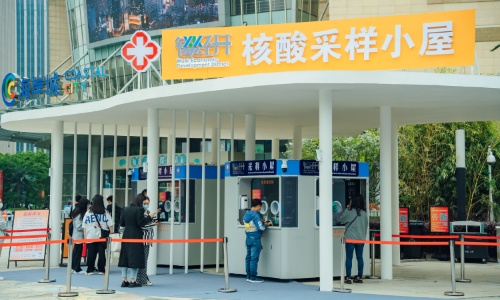
A nucleic acid testing unit developed by Haier Biomedical in Wuxi, East China's Jiangsu Province Photo: Courtesy of Haier Biomedical
For instance, a new type of nucleic acid testing unit developed by Chinese biotech solution provider Haier Biomedical had been deployed in over 3,000 hospitals and community service centers in more than 200 cities as of May 5, to combat the latest resurgence of coronavirus, a representative from the company told the Global Times on Tuesday.
The unit consists of a four-square-meter operating room equipped with air-filtering system, ultraviolet disinfection ray and air conditioning, for the safety and comfort of equipment operators, and the number of testing units can be adjusted according to actual requirements. The sampling process for each person only takes 30 seconds, the company said.
According to an earlier report by China Business News, some Chinese companies originally involved in manufacturing mobile toilets, or environmentally-friendly toilets, have now entered into the industry, developing nucleic acid sampling booths, nucleic acid detection and collection booths for hospitals, and other-feature sampling workstations.
If nucleic acid tests are mandated across all second-tier and above cities, annually 1.7 trillion yuan business volume is to be generated, accounting for 1.5 percent of China's GDP in 2021 - a cost far less than the economic loss caused by widespread lockdowns needed to stifle the virus' spreading, according to Soochow Securities.
More to explore
Wearable equipment, such as VR and AR products have also seen surging popularity as consumers resort to in-home entertainment. Sales of AR and VR hardware devices on JD.com surged more than six times year-on-year in the first two months of the year.
The worldwide market for AR and VR headsets jumped 92.1 percent year over year in 2021, with shipments reaching 11.2 million units, according to a report released by global market research firm International Data Corporation.
Meta's Quest 2 was by far the most popular product with a 78-percent share of the combined AR/VR market last year, followed by DPVR, a Shanghai-based VR technology company, with a 5.1-percent market share globally. ByteDance's Pico VR products ranked third with a market share of 4.5 percent in 2021, the report noted.
